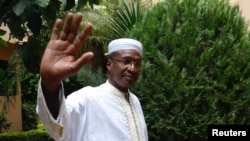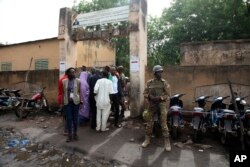As counting continues in Mali's presidential election, a third candidate, Aliou Diallo, has claimed enough votes to enter a runoff with President Ibrahim Boubacar Keïta and his main challenger Soumaïla Cissé. Meanwhile, the turnout has been disappointingly low — partly because of security concerns from Islamist militants in parts of the country.
While early indications point toward a runoff in Mali's presidential election, a third candidate on Tuesday claimed enough votes to enter a second round.
A spokesman for gold magnate Aliou Diallo claimed he had come in second in Sunday's election with enough votes for a run-off on August 12.
President Ibrahim Boubacar Keïta and his main challenger Soumaïla Cissé had on Monday claimed to make it to a second round. Keïta's campaign maintains he is in the lead.
Twenty-four candidates entered Sunday's election to lead a nation suffering from lack of security and frequent attacks by Islamist militants.
The Mali Citizens Observation Pool noted violent incidents all over the country during voting. Its chief observer Ibrahim Sangho said those included voters angry at the absence of observers from opposition parties at polling stations, as reported in the capital. He also noted violent incidents in the regions of Mopti, Taoudenni, and Timbuktu.
The office of Mali Prime Minister Soumeylou Boubeye Maïga said Monday more than 700 polling stations, which were shut down, reported violent incidents, ranging from burning election material to attacks against election officials. But it added that this represents less than three percent of voting stations in Mali.
Mortar attacks near polling stations during Sunday's election were blamed on Islamist militants. Nobody was injured in the attacks.
The violence contributed to a low voter turn-out, raising some questions about the legitimacy of whoever wins.
The Malian electorate has demonstrated its indifference, said voter Ahmed Traoré.
He said there were no crowds, no queues, and that all had gone smoothly. But he said participation rate has not been what it should be, and that is also because people have not been collecting their voters cards.
Observers said voter turnout rates ranged from 20 percent in the northern city of Kidal to 44 percent in the Sikasso region in the southwest.
Turnout was estimated at about 30 percent in the capital, which was not expected to vote for Keïta.
It will be up to Mali's Ministry of Territorial Administration and Decentralization to call the election. The Constitutional Court then validates the results.
The court's decisions have been controversial in the past — some observers say it is too close to the president.
Observation Pool President Mamadou Seydou Traoré said the court's decision must be motivated, based on the law and on jurisprudence. He said the Constitutional Court is the ultimate judge, so a good judgment would contribute to peace and social stability.
The European Union Observer Mission released a statement Tuesday saying the court should prove its transparency in any decisions. Mission leader Cécile Kyenge also called on the candidates to avoid announcing their own vote estimates before the electoral administration.
If no candidate wins more than half the votes, a runoff, planned for August 12, will be held.







